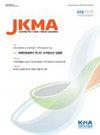Epidemiology, risk factors, and prevention of colorectal cancer
IF 0.5
Q3 MEDICINE, GENERAL & INTERNAL
引用次数: 1
Abstract
Background: Colorectal cancer remains the fourth most common malignancy in Korea, and has been ranked as the third leading cause of cancer deaths in 2020. This study aims to describe the epidemiologic status of colorectal cancer in Korea, and provide basic data for effective primary and secondary prevention methods by summarizing risk factors and screening tools.Current Concepts: Although colorectal cancer incidence and mortality have decreased in recent years in Korea, it still poses a significant public health burden. From the early 1990s until the mid-2000s, the 5-year relative survival of patients with colorectal cancer in Korea continuously increased. This can be attributed to the successful introduction of the government-led screening program; development of improved surgical techniques, anticancer drugs, and adjuvant treatment; and advances medical resources and infrastructure along with economic growth. However, since the late 2000s, the improvement in survival has stagnated. The coronavirus disease 2019 outbreak has reduced hospital visits and screenings, which is assumed to cause delays in diagnosis, leading to a worse prognosis in the patients. To overcome these obstacles, it is essential to explore modifiable environmental risk factors and appropriate screening test methods in Korea.Discussion and Conclusion: Primary prevention through risk factor modification and secondary prevention using suitable screening programs can reduce the incidence and mortality rates of colorectal cancer.流行病学,危险因素,以及结肠直肠癌的预防
背景:大肠癌仍然是韩国第四大最常见的恶性肿瘤,并已被列为2020年癌症死亡的第三大原因。本研究旨在通过总结韩国结直肠癌的危险因素和筛查工具,描述韩国结直肠癌的流行病学现状,为有效的一级和二级预防方法提供基础数据。当前概念:虽然近年来韩国结直肠癌的发病率和死亡率有所下降,但它仍然构成了重大的公共卫生负担。从20世纪90年代初到2000年代中期,韩国大肠癌患者的5年相对生存率持续上升。这要归功于政府主导的筛查项目的成功实施;改进手术技术、抗癌药物和辅助治疗的发展;并随着经济增长推进医疗资源和基础设施建设。然而,自2000年代末以来,存活率的提高一直停滞不前。2019年冠状病毒病的爆发减少了医院就诊和筛查,这被认为会导致诊断延误,导致患者预后更差。为了克服这些障碍,必须在韩国探索可改变的环境风险因素和适当的筛选测试方法。讨论与结论:通过改变危险因素进行一级预防,采用合适的筛查方案进行二级预防,可降低结直肠癌的发病率和死亡率。
本文章由计算机程序翻译,如有差异,请以英文原文为准。
求助全文
约1分钟内获得全文
求助全文
来源期刊

Journal of The Korean Medical Association
Medicine-General Medicine
CiteScore
0.50
自引率
0.00%
发文量
84
审稿时长
4-8 weeks
期刊介绍:
The Journal of the Korean Medical Association (JKMA) is the official peer-reviewed, open-access, monthly journal of the Korean Medical Association (KMA). It contains articles in Korean or English. Its abbreviated title is ''J Korean Med Assoc''. The aims of the Journal include contributing to the treatment of and preventing diseases of public health importance and to improvement of health and quality of life through sharing the state-of the-art scientific information on medicine by the members of KMA and other national and international societies.
 求助内容:
求助内容: 应助结果提醒方式:
应助结果提醒方式:


